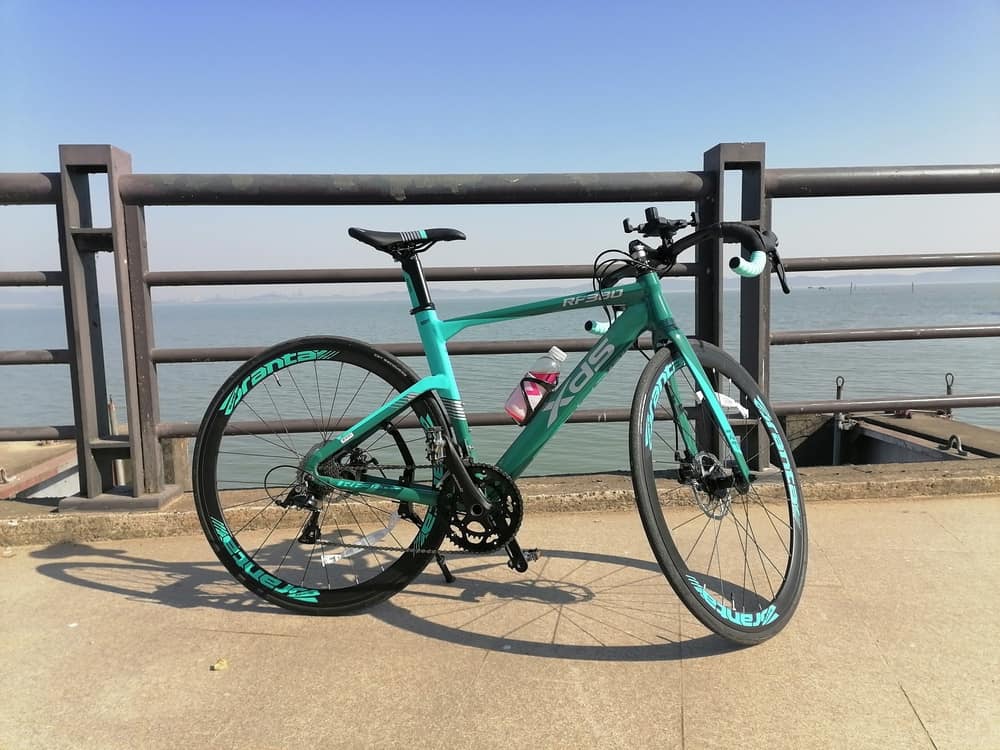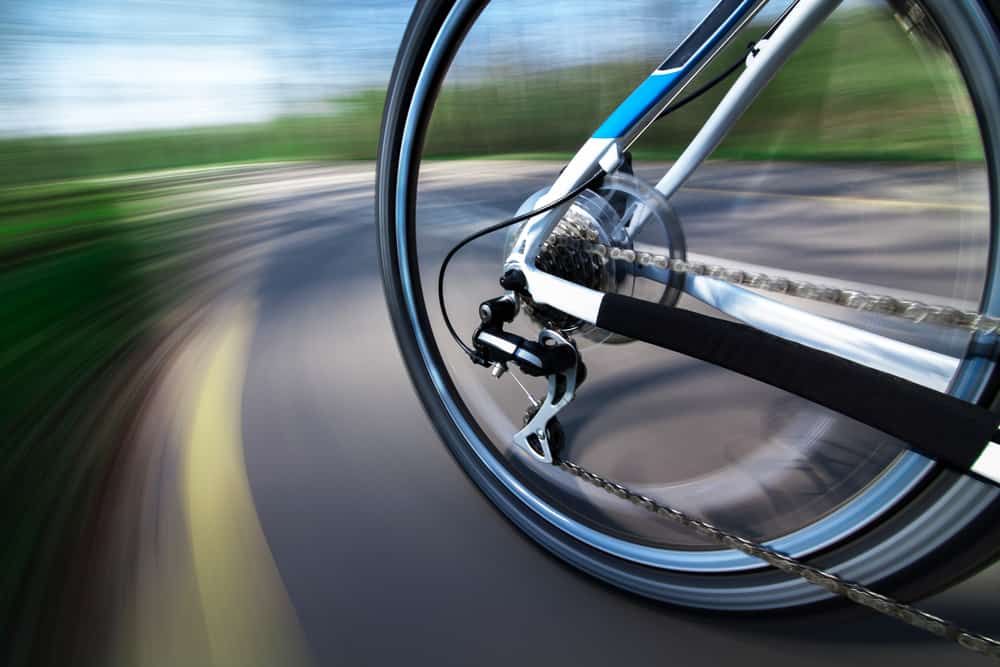There are quite a few options of good road bike wheels for heavy riders.
If you’re an overweight rider, 230+ lbs., we know it can get overwhelming to find the right set of wheels for your road bike. With a quality set of wheels, you can up the performance of your bike and transform your riding experience.
However, the wrong set of wheels could easily discourage heavier riders from biking altogether.
To ensure you make an informed choice, we list the characteristics you need to look out for in wheels. We also tell you how you must shop for good, sturdy wheels for a smooth ride without any dilemmas.
Heavy People’s Cycling Issues
From finding the right bike to checking how suitable it is for a smooth ride, the struggle is real for heavy people.
Even more, some parts of the road bike are critical to consider if you’re over 230+ lbs.
- Frame – A good frame material for heavy riders is steel or aluminum. Due to most bikes’ weight limits, these frame material options can withstand overweight riders.
- Wheels – The wheels are the most common failure point with heavier riders. Double-wall rims are better than single-wall ones, and the more spokes (particularly on the rear wheel than the front wheel), the better.
- Wheel Size – Typically, wheel sizes 26, 27.5, and 29 offer stable, comfortable riding. The 26″ are light wheels, allowing you to cycle faster, while 27.5″ and 29″ wheels give you more control and stability in your ride.
- Brakes – The more the weight on the bike, the harder the brakes must work. A good option for plus-sized riders would be mechanical disc brakes for more braking power.

Look for Certain Characteristics in the Wheel if You are A Heavy Rider
The typical wheels won’t suffice for heavy riders; big guys need a special set of wheels for our road bikes—ones with specialized rims, hubs, and spokes.
Although there aren’t many brands that offer specialized wheels, here’s what you must look out for from the ones that do:
Rim Type
Clincher wheels are the most preferred type of tires for road bikes. The downside is that these are suitable only for flat and rolling terrains.
Heavier riders need sufficiently stiff radially and laterally rims, such as aerodynamic rim profiles. This ensures they don’t give away despite the weight and the ride quality.
We suggest deeper rims for heavier riders to significantly boost the ride performance. Generally, crosswinds may affect deep rims, but for heavy riders, this turns into an aerodynamic benefit with airflow control.
If you’re looking at competitive road racing, tubular rims are suitable. Even under low tire pressure, they provide better comfort in riding without going flat easily.
Tubeless rims are ideal for off-road riding, where flats are more common with aggressive or heavy riders. You could run these with lesser air pressure than clinchers.
Gaining popularity these days are disc wheels used to mount tubeless tires. It’s typically faster than the traditional shallow spoked wheels for road bikes.
Rim Material
The main choices for rim material are carbon fiber, aluminum, and steel.
Carbon rims are lighter, more expensive, and offer a stiff, precise ride. They provide better acceleration, and you’ll be able to turn corners confidently, even at greater speeds.
Wide carbon rims help in keeping the weight of the wheelset low. There’s also a more efficient energy transfer on carbon rims, beneficial on uphill and flat surfaces.
Aluminum rims are more durable, robust, and suitable for riding rough roads or gravel. It absorbs more shock and may save you some energy when riding downhill. However, heavy riders using aluminum rims may see cracks on the spoke nipples of the rear wheel.
Rims can also be made of steel (coated for rust prevention), although less commonly preferred for overweight riders.
Are Carbon Wheels Better Than Alloy?
Yes, and for multiple reasons too! Carbon has less flex, is more aerodynamic, and lighter than aluminum alloys.
This makes your ride smoother and more rigid. You’ll also be able to ride faster, maneuver easier, and ride uphill better.
Rim Width
Wider rims are better suited for rough surfaces, tracks, and dirt roads.
The tires with wider rims have a U-shape and are vertically stiff, with the sidewalls being more vertical. This supports the rider’s weight better without flexing much.
We suggest lowering the air pressure of the tires to utilize the larger tire widths. This provides more grip on hard surfaces.
Crosswinds usually buffer deeper rims that are V-shaped.
Wheel Dimensions
The 700c wheels can easily roll over objects, offering reduced rolling resistance. The large diameter is better than the 650c wheels.
With 650b wheels, higher volume tires can be accommodated. They provide a wider contact area and a better grip while riding.
Spoke Selection
A rule of thumb is that a higher spoke count supports more weight.
We recommend heavier gauge spokes that have increased lateral stability owing to the thick cross-section of the spokes. With more spokes, there is less stress on each individual spoke, leading to a more durable wheel.
To avoid broken spokes because of your weight pressure, we suggest going for nothing less than 32 spokes on the front and rear wheels. You could consider 32-spoke straight pull spokes with quality hubs.
While double-butted spokes suffice for most applications, you could also look into triple-butted spokes.
TIP: An ideal way to ride is byreducing the air pressure in the wheels, leading to a higher spoke tension.

Tires
Road bikes can use clincher, tubeless, and hookless tires.
Ensure that the wheel you purchase can accommodate the tires you intend to use.
The bead hooks into a rim in clincher tires and inner tubes keep the tire inflated. While tubeless tires may also have the bead hooking into a rim, hookless rims are gaining popularity these days.
Hookless and tubeless rims aren’t necessarily compatible, even though both seal air between the rim and tire.
Should You Go Tubeless?
Tubeless tires are an excellent addition to your road bike. These are well-suited for big and powerful riders, as they’re user-friendly and there’s no risk of pinch flats.
Many riders are switching to tubeless tires and disc brakes these days.
Tire Pressure
As a heavy rider, you need wheels that can handle your weight. This implies tires with slightly more PSI.
Narrow road bike tires are the ones that need the highest pressure. The purpose of running the tires at high pressure is to avoid flats and reduce rolling resistance.
Brands
There are a few brands that make road wheels suitable for heavy riders. The list includes ROL, Mavic wheels, Vuelta Corsa HD, Hunt wheels, and Zipp wheels. Some of the brands you can find HERE.
We know the troubles overweight riders can experience with their wheels, so we suggest you go for brands with good customer support.
ROL wheels are suitable for heavy or aggressive riders. What’s unique about ROL is that you can buy a set of wheels, and if you don’t like the feel or experience of your ride after trying them, ROL buys it back from you!
Where to Shop for Wheels for Overweight Riders
Finding a suitable set of wheels at your local bike shop might be slim. You must reach out to established wheel companies and discuss your needs.
Inform them about wheel issues you’ve experienced earlier, the wheel brands and types you’ve used, and describe your requirements for the ideal wheels.
Heavy riders need specially made wheelsets. So looking for wheel makers offering production and custom wheel models would be best.
You could go for wheels specially made for heavier riders. Production models have specific products/series that promise a good overall performance while not pinching your pocket.
Or, you could choose wheels that can be customized (including increasing the spoke count).
We agree that customization could get expensive. But then, won’t you be spending time and effort otherwise on broken spokes, dealing with similar issues, or selecting the wrong product spec?
Summing It Up
For a smooth ride, good performance, better handling, durability, and stiffness, go for any of the best road bike wheels for heavy riders.
If you cannot find good wheels around your local bike shops easily, reach out to manufacturers or other fellow plus-sized riders. Communicating your issues and your criteria for the ideal wheels may get you a solution.
We hope you’re better informed to get the wheels that your road bike and you deserve!